Health services respond with changes after research reveals chance to improve temperature checks in prehospital births

Emergency services call handlers and paramedics have improved their working practices in response to findings from UWE Bristol research into out-of-hospital births.
Some 3,700 babies are born in the UK each year in a pre-hospital setting, with these newborns experiencing poorer health outcomes when compared to babies born in hospital. Paramedics often attend these births, many without the support of a midwife.
Research led by UWE Bristol’s Dr Laura Goodwin found that only a tiny fraction of babies born out-of-hospital in the South West of England were having their temperatures routinely recorded by paramedics. Guidelines recommend that every baby should have their temperature checked, as hypothermia is a serious health risk for newborns in the minutes immediately following birth.
During the three-year period of study investigating normal deliveries, only 2.7 per cent of babies had temperature measurements recorded. Of these, 72 per cent were hypothermic on arrival at hospital.
The research findings led Dr Goodwin to work with health officials to formulate a series of recommendations to improve outcomes for babies following unplanned out-of-hospital birth.
Her work across two academic studies resulted in changes to neonatal temperature management advice given by emergency call handlers - also known as emergency medical dispatchers - responding to calls in the UK and internationally regarding a pre-hospital birth. Dr Goodwin also used these findings as a basis for collaboration with the Lead Quality Improvement Clinician at South Western Ambulance Service NHS Foundation Trust (SWASFT) to change paramedic practice in ways that have resulted in better measurement and management of neonatal temperature.
Changes have been implemented by the NHS Pathways and AMPDS (Advanced Medical Priority Dispatch System), triage systems in the UK and over 50 other countries. SWASFT has introduced TransWarmer infant warming mattresses to all frontline vehicles, restocked their under-arm thermometers and revised the digital patient care record system (ePCR system) to better highlight documentation of newborn observations.
"Temperature management is one of the biggest risk factors for babies born in an out-of-hospital setting but it’s also one of the easiest issues to address."
Dr Laura Goodwin
Dr Goodwin, an Associate Professor in Emergency Care at UWE Bristol’s School of Health and Social Wellbeing, said: “Temperature management is one of the biggest risk factors for babies born in an out-of-hospital setting but it’s also one of the easiest issues to address. A baby’s risk of death rises by 28 per cent with each degree below 36.5 degrees of body temperature recorded on arrival at hospital. A baby can become hypothermic in about five minutes, and there is a key window of opportunity for taking action to increase or maintain the baby’s temperature.
“We found that paramedics were drying and wrapping the baby but the taking of the baby’s temperature was not always prioritised or possible due to the stressful nature of an unplanned out-of-hospital birth. Paramedics are responsible for making checks on the birth itself, monitoring the baby’s breathing, and ensuring that the mother is not bleeding - there are so many things for the paramedic to think about that the recording of temperature was not always being considered.
“These births could be taking place anywhere – from homes to shopping centres and cinemas – and it can be very difficult to maintain the baby’s temperature because the facilities might not be available. For example, there might not be a warm room, an incubator, or even dry towels.
“Changes to the 999 call advice relate to the emergency medical dispatcher emphasising how important it is to keep the baby warm and giving practical suggestions such as closing windows and doors, and recommending skin-to-skin contact between mother and baby.”
Dr Sarah Black, Head of Research, Audit and Improvement at the South Western Ambulance Service NHS Foundation Trust, said: “We have a long-established partnership of research development and delivery with our colleagues at UWE Bristol. It is pleasing to see that this collaboration with Dr Goodwin, generated from the initial clinical audit findings of our Lead Quality Improvement Clinician Katie McNee, will result in both raised awareness of temperature checks, and more effective thermoregulation of babies born in the prehospital environment.”

In her initial study, co-authored with SWASFT and funded by UWE Bristol, Dr Goodwin’s research focused on an analysis of ambulance service data from SWASFT between January 2017 and January 2020, along with interviews with paramedics exploring their experiences of attending birth in the pre-hospital setting and any barriers to temperature measurement.
Data from the interviews suggested barriers included unavailable or less suitable equipment, prioritisation of other care activities, lack of exposure to births, and uncertainty regarding responsibilities and roles. Possible facilitators included better equipment, physical prompts, and training and awareness-raising around the importance of temperature measurement.
Dr Goodwin’s second study, funded by Health Innovation South West, aimed to capture the proportion and demographics of babies arriving at hospital hypothermic following prehospital birth in the South West of England, and investigating opportunities to improve temperature management advice given by emergency medical dispatchers during calls regarding out-of-hospital births.
Data from six hospital trusts in South West England between January 2018 and January 2021 showed that 35 per cent of babies conveyed to hospital were hypothermic on arrival. Women with documented safeguarding concerns at booking, previous live births, and those who book their pregnancy past 13 weeks’ gestation may be more likely to experience out-of-hospital birth, the research showed. Pre-term babies, babies to first-time mothers, and babies born to mothers with disability or safeguarding concerns at booking were more likely to be hypothermic following prehospital birth.
Dr Goodwin’s research on emergency medical dispatcher advice focused on the analysis of call transcripts from two ambulance trusts (in the South West and North East of England) followed by focus groups with NHS staff and patients. NHS staff and members of the public made several recommendations for changes to the script to address potential barriers to good thermal care. Findings identified areas for improvement in emergency medical dispatcher advice regarding neonatal temperature management.
Dr Goodwin said: “I conducted interviews with paramedics to ask why the figure on temperature recordings (2.7 per cent) was so low, and went to quality improvement meetings at the ambulance trust to discuss possible changes to address the barriers that paramedics were facing.
“One of the reasons temperatures were not being taken was equipment. While in-ear thermometers are not suitable for babies under three months, the under-arm thermometers often went missing or ran out of batteries due to infrequent use. With newborn babies wriggling around, it could also be difficult to get the thermometer in the right place, and so some paramedics felt they were not providing accurate readings.
“Another reason was the rarity of pre-hospital births taking place. There are only about 600 cases a year in the South Western Ambulance Service area, and some paramedics had never had the experience of dealing with one, meaning they were not as confident as they would be in other emergency situations. Paramedics were checking breathing, and ensuring the baby was dried and wrapped up, but in many cases the follow up checks – including temperature measurement - were not being made.”
The academic papers and abstracts are available to view on the links below:
Related news

12 December 2025
UWE Bristol’s environmentally conscious and student-focused accommodation wins three awards
Purdown View, the world's largest certified Passivhaus student accommodation development, has been recognised at Property Week Student Accommodation Awards.

13 November 2025
Alliance Medical and UWE Bristol launch UK’s first PET-CT postgraduate certificate
In a move set to transform imaging education, Alliance Medical (AML) and UWE Bristol have joined forces to co-design and develop the UK’s first PET-CT Postgraduate Certificate (PG Cert).

10 November 2025
Lessons from Low Traffic Neighbourhoods will drive better public engagement, study finds
Lessons from Low Traffic Neighbourhoods have informed a new toolkit to improve engagement with the public on challenging local street issues.

29 September 2025
Smartphone use hitting struggling pupils hardest, major study finds
Young people struggling with their studies at school are much more likely to have negative experiences on their smartphones than their better performing peers, a major new study has found.

11 September 2025
New study to investigate augmented reality as an intervention for emotionally based school avoidance
A UWE Bristol researcher will support a new study exploring whether an augmented reality board game can help young people with emotionally based school avoidance (EBSA).

28 July 2025
Student wins bronze medal at World Aquatics Championships on her graduation day
UWE Bristol sports rehabilitation student Izzy Thorpe made waves at the World Aquatics Championships winning a bronze medal in artistic swimming on the same day she was meant to be crossing the stage at her university graduation ceremony.

28 May 2025
Leading organisations fighting to end youth violence in cities join UWE Bristol event panel
Leaders from Bristol-based Empire Fighting Chance and Canadian non-profit REACH will speak at the next Bristol Distinguished Address Series.
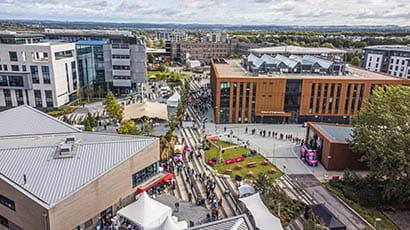
09 May 2025
UWE Bristol among first universities in UK to introduce sanitary waste bins in male toilets
UWE Bristol is among the first universities in the UK to introduce sanitary waste bins in male toilets for the disposal of incontinence products.
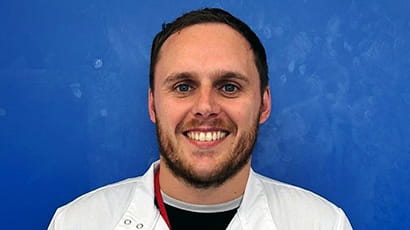
11 April 2025
UWE Bristol academics among emerging scientific leaders to receive share of £7.6m for health research
Two UWE Bristol researchers are among the recipients of a £7.6 million investment from the Academy of Medical Sciences aimed at tackling urgent health challenges.
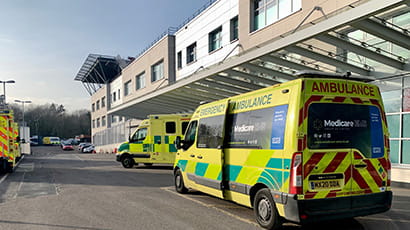
09 April 2025
New research to support a thriving health and care workforce is launched
A national research partnership will explore ways to support wellbeing and sustainability in the NHS and social care same day and urgent care workforce.

10 March 2025
UWE Bristol to explore the power of open water swimming at upcoming event with The Wave founder Nick Hounsfield
An inspiring tale of grit and resilience will be told to audiences at the first BDAS event of 2025 as UWE Bristol welcomes Nick Hounsfield, founder of The Wave.
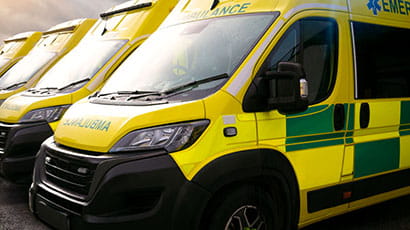
28 February 2025
Paramedics in GP surgeries may ease workload but not NHS costs, study finds
Paramedics working in GP surgeries help reduce GP workload but do not contribute to cost savings to the NHS, according to the first major study of the clinical and cost-effectiveness of paramedic compared with GP consultations.
You may also be interested in

Media enquiries
Enquiries related to news releases and press and contacts for the media team.
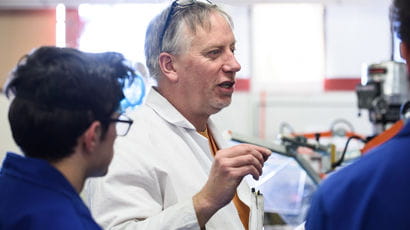
Find an expert
Media contacts are invited to check out the vast range of subjects where UWE Bristol can offer up expert commentary.
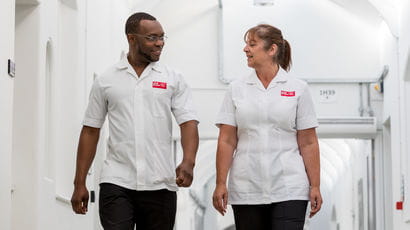
School of Health and Social Wellbeing
The School of Health and Social Wellbeing is home to all our courses and research related to this varied and rewarding sector.
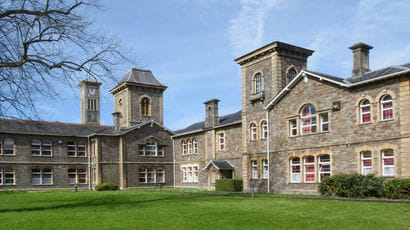
Centre for Health and Clinical Research (CHCR)
Bringing together researchers working in the fields of long-term conditions, palliative and supportive care, and emergency care, to inform knowledge mobilisation across the lifespan.






